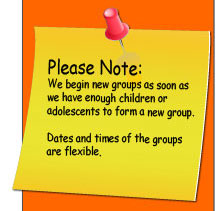| January/February 2011 - Volume 54 | |
| Helping Children and Adolescents Succeed Socially! | |
| The Social Skills Groups | Parent Child Communication |
|
How it will affect children throughout their life. Good communication will help children to know how to make and keep friends. “What a child does not receive, he cannot give later in life.” “When you teach your child, you teach your child’s child.” There is an unconscious dynamic process that goes on with parents and their children. It is an internal process; it is there whether you are aware and whether you understand it or not. Imagine a circle representing you the parent, and your child as another circle overlapping yours. The green circle represents the parent’s experiences and personal life events while growing up, you. The white circle represents your child, and your child’s feelings. Within the parentheses represents a new structure that the parent-child relationship creates; New experiences. This is a new invisible entity so to say, a creation of a subjective other, something the parent child couple create while interacting and relating to one another. If you put two parents in the picture, the second parent represents a third circle, and things get that much more complex.
Children identify with their parents capabilities. Do we want our children to take on our intentional and thoughtful behaviors, and tolerant and patient ways? (Our love and passions for life? Our good work ethics?) Or do we want our children to take on our intolerant, impatient, disorganized ways? Who we are as parents gets internalized by our children. We as parents need to be a container to hold our child’s emotional experiences until they can take on this role themselves. That is an interesting idea. What does it mean? It means that we calmly listen to our children’s feelings and contain them since feelings can overwhelm children. We need to tolerate their feelings so they can learn to tolerate their feelings. And sometimes feelings are angry feelings that push a button within us, but we need to tolerate them and stay calm and in control. We need to let our children borrow our Ego Strength (Sigmund Freud). Ego Strength helps us maintain emotional stability and cope with internal and external stress. Children borrow that strength from us; they use us to regulate their behavior, until they can take on these abilities themselves. This is part of child development. Two examples of this are, they borrow us to sooth themselves, and to control behaviors in themselves. You can tell them, “I will help you to feel calm.” “I will help you to be in control.” What if the parent is not able to help their child to do this, and instead their own life experiences and events are full of unresolved anger and chaos? So the green circles (the parents) are full of unresolved feelings from their life experiences. Well it will not be good. I am trying to help you to become the best parent you can become. If you find that, you have unresolved feelings and life experiences within yourself and within your family, you need to take responsibility and seek support for yourself. You need to get the support to transform you into the parent you want to be. Parents need to explore and understand their own experiences as children. Only then can you bring the right life skills to your children. There is meaning behind a child who is acting up. So looking at the above circles we can begin to understand how the child learns to exist and behave. Children live what they learn. If your child pushes an impatient, angry, or disappointed button within you, what does that mean? Your children may push a happy button, what does that mean? And how can you create more of that together? What can we do as parents to create wonderfully healthy new experiences, the place that is within the two parentheses above? That new invisible entity so to say. Teach your children well:
~ The inspiration of this newsletter was attending a seminar taught Susan Stern, LCSW is the founder of The Social Skills Place, Inc. |
| The Social Skills Place, Inc. :: 310 S. Happ Rd, Suite 201 :: Northfield, Illinois 60093 Office 847 446-7430 :: Cell 847 507-8834 :: www.socialskillsplace.com |
|
| (C) 2006-2021 :: All Rights Reserved :: Unsubscribe from our mailings |

